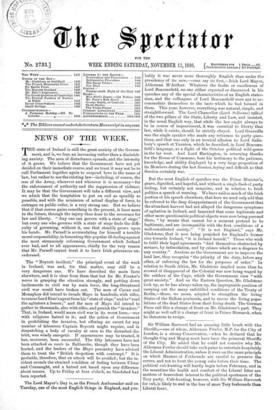But the most English of speeches was the Prime Minister's,
grave, dignified, and hopeful, and without a single flash of party feeling, but certainly not sanguine, and in relation to Irish politics a speech of warning. We have said so much of the Irish portion of his speech elsewhere, that here we need only add that he referred to the deep disappointment of the Government that the abundant harvest had not allayed the dangerous symptoms of agitation in Ireland, and lamented that some legitimate and other more questionable political objects were now being pursued there, " by means that cannot for a moment pretend to be legitimate, and are incompatible with the first conditions of a well-constituted society." "It is not England," says Mr. Gladstone, that is now being punished for England's former sins towards Ireland, "it is Ireland herself." Those who wish to fulfil their legal agreements "find themselves obstructed by menace, by intimidation, and by crimes which are a disgrace to any country." Anxious as the Government are to improve the land law, they recognise "the priority of the duty, before any other, of enforcing the law for the purposes of order." In relation to South Africa, Mr. Gladstone implied more than he avowed of disapproval of the Colonial war now being waged by the settlers of the Cape, which the Government view " with great anxiety." And on the Eastern Question, Mr. Gladstone took up, as he has always taken up, the impregnable position of carrying out the many unfulfilled conditions of the Treaty of Berlin,—those, we mean, adapted to strengthen the living States of the Balkan peninsula, and to rescue the living popu- lations of the dead States from their living death. The German Press call this a change of front on Mr. Gladstone's part. They might as well call it a change of front in Prince Bismarck, when he threatens to resign.


































